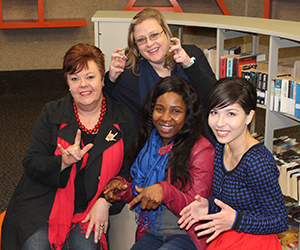Latest News Archive
Please select Category, Year, and then Month to display items
02 January 2025
|
Story Edzani Nephalela
|
Photo Lethabo Machabaphala
 From the left are, Prof John Klaasen, Dean of the Faculty of Theology and Religion; Prof Vasu Reddy, Deputy Vice-Chancellor: Research and Internationalisation at the UFS; Prof Anthea Rhoda, acting Vice-Chancellor and Principal of the UFS; Prof Allan Boesak; Prof Nico Koopman, Deputy Vice-Chancellor: Social Impact, Transformation and Personnel at Stellenbosch University; and Dr Eugene Fortein, Senior Lecturer: Historical and Constructive Theology at Prof Boesak’s book launch.
From the left are, Prof John Klaasen, Dean of the Faculty of Theology and Religion; Prof Vasu Reddy, Deputy Vice-Chancellor: Research and Internationalisation at the UFS; Prof Anthea Rhoda, acting Vice-Chancellor and Principal of the UFS; Prof Allan Boesak; Prof Nico Koopman, Deputy Vice-Chancellor: Social Impact, Transformation and Personnel at Stellenbosch University; and Dr Eugene Fortein, Senior Lecturer: Historical and Constructive Theology at Prof Boesak’s book launch.
In a world increasingly defined by the stark contrasts of power and vulnerability, the concept of democracy often reveals itself as a double-edged sword. For the children of struggle – those who have grown up amid the chaos of inequality and conflict – democracy can feel like a distant promise, an ideal often outmanned by the realities they face. The deception of hope lingers in the air as aspirations clash with systemic barriers, leaving many to navigate a landscape where a harsh daily existence obscures the principles of freedom and justice. This exploration seeks to uncover the intricate dynamics between hope and disillusionment, shedding light on the lived experiences of those who yearn for a brighter future yet grapple with the weight of unfulfilled promises.
This was the essence of the public lecture titled Outmanned by Democracy: Children of Struggle, Deception, and Hope, presented by Prof Allan Boesak, a theologian and political activist, on the Bloemfontein Campus.
Prof Boesak confronted the continuous socio-economic challenges faced by South Africa and other nations, including racism, narrow ethnic nationalism, and the revival of tribalism. He emphasised the role of churches in tackling these issues. “The responsibility of churches is to articulate what politicians are often afraid to say,” he stated. “Put your ideologies into practice and leverage your power as ministers of the Word to shape the future and reclaim the dignity of your people. This is where unity transcends colour and stature. Consider the various roles that churches could play in reconciling communities, as seen in the Gaza crisis.”
During his visit to the UFS Faculty of Theology and Religion, Prof Boesak also launched a four-volume set titled The Fire, The River and the Scorched Earth: Fifty Years of Black Theology Through the Lens of Allan Boesak. The first three volumes include his lectures and responses from various theologians, while the fourth contains his sermons. This body of work aims to document, critique, and celebrate the contributions of black theology, highlighting its role in the struggle for justice and liberation and underscoring Prof Boesak’s unwavering commitment to freedom, liberation, and democracy.
In a time when hope and disillusionment coexist, Prof Boesak’s insights remind us of the transformative power of faith and activism in the continuing fight for a more equitable world
Largest group on African continent introduced to Sign Language
2016-07-05
 The introduction of basic Sign Language
The introduction of basic Sign Language
as part of the UFS101 course was a great
success. From left are Susan Lombaard,
Annemarie le Roux, Tshisikhawe Dzivhani
(all from the Department of South African
Sign Language), and Lauren Oosthuizen
(UFS101). Photo: Leonie Bolleurs
As a result of a new initiative at the University of the Free State (UFS), the largest group of students on the African continent took part in a first-year seminar which included Sign Language.
A total of 5400 students on the Bloemfontein Campus and 1000 on Qwaqwa Campus were taught basic Sign Language by Susan Lombaard, Acting Head of the Department of South African Sign Language, and her team members, Tshisikhawe Dzivhani, Annemarie le Roux, and Nicolene de Klerk.
It forms part of the UFS101 module presented to all first-year students. The initiative, begun in the first semester of 2016, will form part of UFS101 in future and was met with an overwhelmingly positive response.
Three segments of course
Sign Language was taught in three segments and positioned as large-class learning experiences in the Callie Human Centre (Bloemfontein Campus) and the Nelson Mandela Hall (Qwaqwa Campus). Students were taught about deaf culture, Sign Language theory, as well as how to sign their names, exchange pleasantries, and have a basic conversation.
A valuable skill to have
“It (the Sign Language experience) was very interesting and helpful,” said one of the students. “It is important to have the ability to communicate with all sorts of people, and to be able to help them in a crisis”. According to another, it sparked an interest in Sign Language. “It is a skill I will continue to use and try to learn more from it,” said a third.
Lombaard – in collaboration with the UFS101 team – will be presenting a paper related to this achievement at the DeafNet Africa Conference in Johannesburg, from 26 to 30 September 2016.